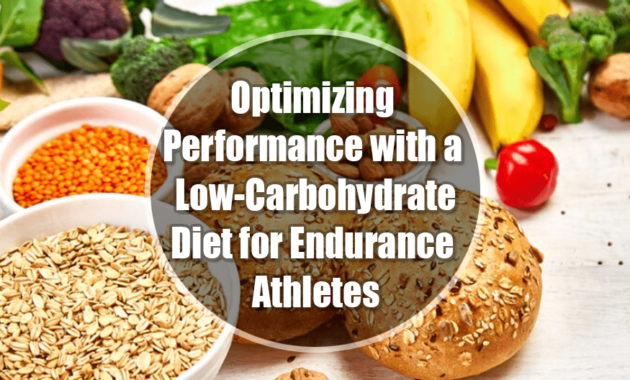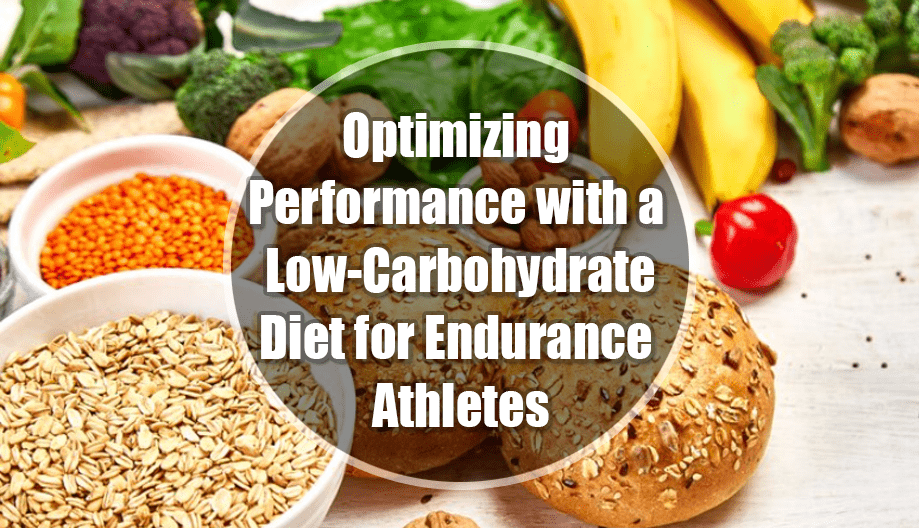The average endurance athlete eats a diet of about 50-60%+ carbohydrate, 20-30% protein and 20-30% fat. As I talk about the problem with this type of dietary intake is not necessarily the percentages (unless you are indeed trying to eat a low carbohydrate diet), but instead, the source from which many of these foods are commonly derived – from sources such as cookies, crackers, pasta, biscotti, scones, bagels, muffins, energy bars, juice, processed trail mixes, etc. These foods and others like them are very high in vegetable oils, inflammatory omega-6 fatty acids, preservatives, processed ingredients, potential food allergens, and refined sugars.

The low carbohydrate diet for triathletes addresses these issues and includes the following components:
Higher Fat Percentage: With a macronutrient percentage of closer to 50-60% fat, 20-30% carbohydrate, and 20-30% protein, the low carbohydrate diet not only naturally eliminates many of the unhealthy food ingredients present in a higher carbohydrate diet, but also introduces more stable energy levels, less inflammation, and better weight loss. While the lower carbohydrate percentages will not sustain heavy bouts of high-intensity exercise, they are perfect for lasting health, longevity, weight loss, or elimination of digestive issues from food intolerances.
Carbohydrate Cycling: If long-term carbohydrate deprivation and depletion of storage carbohydrate levels are accompanied by frequent training bouts, the immune system can eventually become depressed, physical performance and mood can decline, and the risk of overtraining can increase. For this reason, storage carbohydrates should be “re-loaded” once per week, preferably on a higher volume training day, during which the increased carbohydrate intake will be less damaging to the body. The meal plan in this guide is a six-day low-carbohydrate, one-day moderate-to-high carbohydrate diet, and the higher carbohydrate intake day should preferably be the most challenging day of the week (typically a Saturday or Sunday for most endurance athletes).
Fasted Sessions: If the goal is weight loss, then more rapid fat-burning results can be attained by including fasted morning exercise sessions in this program. To implement these, wake up in the morning without eating anything (coffee is fine) and then exercise for 30-60 minutes. The exercise should be an easy aerobic session since hard training sessions are more challenging on an empty stomach and may result in “junk” training. Usually, a leisurely swim, bike ride, yoga session, or even a walk with the dog is generally sufficient. If working out in a fasted state is not possible, then it would be preferable to include longer fasted session, in which dinner is completed 3-4 hours before bedtime, and then breakfast is eaten 1-2 hours after waking, which, with 7-8 hours of sleep, can result in an 11-14 hour fast. You do not need to include fasted workout sessions or fasts every day of the week. I have these sessions 2-3 times per week, and my clients attempting more rapid fat loss will include these sessions 5-6 times per week.
Carbohydrate Intake During Long Workouts: Your gut needs to be trained to absorb as many calories as it will be taking in on race day, so if you are a Half-Ironman or Ironman athlete, at least once every two weeks, one of your long workouts (typically the bike or run) will need to be accompanied by the use of gels, sports drinks, bars or other carbohydrate sources. Although volume will highly vary depending on size and training status, calorie intake for these carbohydrate-fueled long workouts for males will be 300-450 calories per hour on the bike and 200-300 calories per hour on the run, and for females, will be 250-400 calories per hour on the bike and 150-250 calories per hour on the run. All your other long workouts can be minimally fueled, with 1/2 to 1/3 as many calories as you plan on consuming on race day, and you do not need to fuel at all during any workouts that are an hour or less.
Basic Food Overview: Since you’ll be eating a high percentage of fats, your kitchen will be stocked with coconut milk, coconut oil, coconut shavings, avocadoes, olives, extra virgin olive oil, macadamia nuts, pumpkin seeds, walnuts, sardines, salmon cheese, heavy cream, whole fat yogurt and fatty cuts of beef. For added protein, you’ll also have eggs and chicken. Carbohydrate sources will be clean-burning, easily digestible fuels, including sweet potato, yam, white rice, brown rice, and fruit. Liberal consumption of nonstarchy vegetables is also included.
Supplements: Your supplementation protocol should include four essential foundation supplements that are highly beneficial for health and performance: Vitamin D, magnesium, fish oil, and a greens powder or greens capsule. A multivitamin will not be necessary if these supplements are consumed simultaneously with the rest of the foods on the plan. You should include probiotics and digestive enzymes (optional) for added digestive health. For added performance, you can consist of a full-spectrum antioxidant, and for added recovery, you can include a glucosamine-chondroitin, whole amino acid, and proteolytic enzyme supplement (all optional).
The following pages will introduce you to grocery shopping, then your meal plan for a regular week of training, a fueling plan for long workouts, a race week meal plan, and a race day meal plan.
Please be warned that as you transition to a low-carbohydrate diet, you will go through a “keto-adaptation” period, during which your body becomes accustomed to burning fatty acids as a primary fuel. Depending on how high your carbohydrate intake was before embarking upon this low-carbohydrate dietary approach, you will go through a period of low energy, fatigue, irritability, and subpar workout performance for anywhere from 4 days to 2 weeks.
This drop in energy is entirely average and will subside after at least two weeks. Consider yourself warned, and as you have probably guessed, you should not switch to this diet if you are two weeks or less away from an important race or competition.

